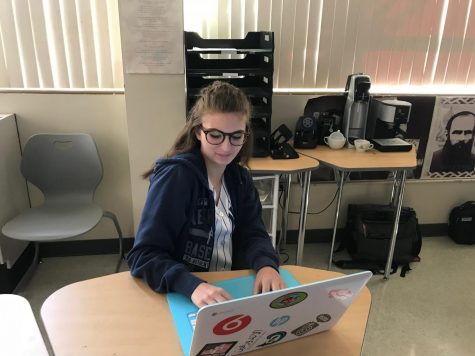Climate Change: Will It Really Affect the Economy?
On November 24, 2018, the National Climate Assessment was released, putting not only the climate but also the economy into question. According to the assessment, the economy could be severely damaged if climate change continues at this rapid rate.
December 3, 2018
The national economy could be affected due to climate change. The National Climate assessment claims the rising temperatures, natural disasters, and ocean acidification and rising waters will have a major effect on the economy. Trade, agriculture, and energy would be the first to be majorly affected by climate change. If agriculture and the fishing industry are affected, it would cause our trade to decrease, impacting local and national economies. As the temperature increases, there will be a higher demand for energy, resulting in higher electricity costs.
“However, the continued warming that is projected to occur without substantial and sustained reductions in global greenhouse gas emissions is expected to cause substantial net damage to the U.S. economy throughout this century, especially in the absence of increased adaptation efforts.” the National Climate Assessments said. “With continued growth in emissions at historic rates, annual losses in some economic sectors are projected to reach hundreds of billions of dollars by the end of the century—more than the current gross domestic product (GDP) of many U.S. states.”
One of the most visible signs of climate change is the recent California Wildfires. The fires were caused by an accident at an electrical plant, but most likely wouldn’t have spread if climate change wasn’t a factor. California has been experiencing a drought since 2006, according to USA Today. The death toll of the fire has risen to 88, with 203 people still missing.
The Camp Wildfire is an example of how climate change will affect the economy. California is one of the most important agriculture states, the wildfire destroyed businesses and homes which helped California’s economy, ultimately helping the national economy.
Michael Mann, a leading climate scientist spoke with NPR’s Michel Martin about the National Climate Assesment, “The cost of inaction is reaching into the tens of billions of dollars. And, as this report makes clear, we will be talking about hundreds of billions of dollars in the future,” Mann said. “So what is now maybe a 1 percent tax on our economy from climate change impacts will become a 10 percent tax on our economy.”
Wildfires are not the only visible signs of climate change. The ice caps are melting, causing oceans levels to rise. Greenland lost an average of 281 billion tons of ice between 1993 and 2016, while Antarctica lost about 119 billion tons in the same period, according to NASA’s Gravity Recovery and Climate Experiment. When the ice melts into the ocean, it causes the sea levels to rise. Many cities like Shanghai and Venice will eventually be completely submerged underwater. As the ocean continues to rise, the economy is affected because coastal cities and shorelines will have to be protected.
“Lasting damage to coastal property and infrastructure driven by sea level rise and storm surge is expected to lead to financial losses for individuals, businesses, and communities, with the Atlantic and Gulf Coasts facing above-average risks,” the assessment says. “ Impacts on coastal energy and transportation infrastructure driven by sea level rise and storm surge have the potential for cascading costs and disruptions across the country.”
The Midwest is currently facing a massive winter storm in the middle of November. Winter officially starts on December 21. There are climate change skeptics who believe that because there is a winter storm the earth is about to go through an ice age. The ice caps are melting, which in turn causes the cold air in the Arctic to make its way to the northern part of the country. Climate change carries more moisture in the air, so when the temperature drops, Americans experience more winter storms than in the past.
Climate change is something that is undeniable. As Americans, we shouldn’t focus on how to stop it, because reversing it is impossible at this point. We need to focus on how to help stop it from continuing and hopefully reduce the risks of climate change.





